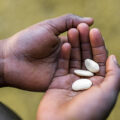ASSOCIATED PRESS
ABOVE PHOTO: Two students are treated inside a Red Cross ambulance after clashes at the University of Haiti in downtown, Port-au-Prince, Haiti, Friday, Feb. 17, 2012. The office of President Michel Martelly said him and his accompanying motorcade were attacked while he strolled through the capital’s downtown area in a Carnival procession. Witnesses say rocks were thrown at him from behind the university building and police responded by firing shots in the air and unleashing tear gas.
(AP Photo/Ramon Espinosa)
Haiti has seen a dramatic increase in violent crime in the shanties of its major cities over the past six months, helping undermine faith in the country’s police force, according to a study released Sunday.
The preliminary findings in the report titled “Haiti’s Urban Crime Wave?” speak to rising concerns among Haitians that their country is entering a period of political turmoil that could thwart efforts to help rebuild in the aftermath of the powerful January 2010 earthquake.
Homicides in the heavily populated areas of Haiti’s biggest cities appear to have increased sharply from August 2011 to last February, according to the study authored by social scientists Athena Kolbe and Robert Muggah, and backed by the Canadian government’s International Development Research Centre and the Brazil nonprofit, the Igarape Institute.
While the homicide rate in Port-au-Prince is lower than that of some other Caribbean cities, Haiti’s capital saw 60.9 murders per 100,000 residents over the year leading up to February 2012, the highest recorded murder rate since 2006, according to the study. For example, the Bel Air district of Port-au-Prince saw homicides jump from 19 per 100,000 people in 2010 to 50 per 100,000 people near the end of 2011.
“This murder rate is not just high — it’s enormous,” Kolbe said.
In comparison, New York City’s homicide rate was less than 7 per 100,000 in 2011, while Oakland, California, had 23 homicides per 100,000 residents.
The bulk of the Haiti murders happened in densely populated areas in the cities where there are high levels of social marginalization and poverty, which included Cap-Haitien, Les Cayes, Gonaives, among others.
Police chief Mario Andresol said he needed to review his crime statistics to see if they reflected the findings of the report but conceded that Haiti has long seen a spike in crime when political instability takes hold.
“When you have political turmoil you have problems with insecurity,” Andresol said by telephone. “There is a kind of destabilization of society.”
Haiti is at a fragile moment in its history with quake reconstruction effort advancing slowly and hundreds of thousands of people still living in rough-and-tumble camps. Also, Haiti’s prime minister abruptly resigned last month because of infighting with President Michel Martelly and it’s unclear when a successor will be approved by Parliament. Meanwhile, thousands of supporters of former President Jean-Bertrand Aristide recently rallied in the streets to bash Martelly’s reconstruction efforts.
According to the authors of the study, there is no single factor to explain the rise in violent crime but they point to a frustration that stems in part from the many international humanitarian groups that came to Haiti after the earthquake.
Many aid groups came to urban neighborhoods and pumped in money and resources, before withdrawing just when they were needed most, said Kolbe, a doctoral candidate in social work and political science at University of Michigan.
This interrupted social networks in these neighborhoods, she said.
“You have people coming in from aid agencies, giving money to some groups within the community and not others,” Kolbe said in an interview at her home in the Port-au-Prince area. “This disrupted the community, and then there’s been this abrupt pull out now of the funds.”
Muggah is a fellow of international relations at the Catholic University of Rio de Janeiro in Brazil. Kolbe and Muggah collected their data from interviews with 3,000 households in Haiti’s major cities. The survey used random sampling methods.
The study also noted that for the first time since 2007 confidence in the Haitian National Police force has plunged among city dwellers, which is in contrast to the faith that was found in the force in the aftermath of the earthquake.
Almost one in five respondents expressed concerns that police officers were unable or unwilling to protect them from crime.
















Leave a Comment